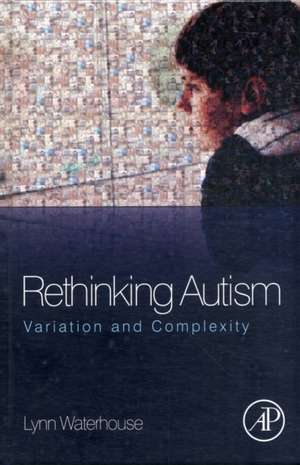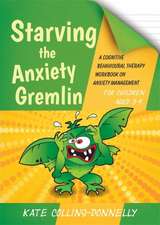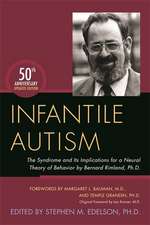Rethinking Autism: Variation and Complexity
Autor Lynn Waterhouseen Limba Engleză Hardback – 24 oct 2012
- Autism is a massive worldwide problem with increasing prevalence rates, now thought to be as high as 1 in 38 children (Korea) and 1 in 100 children (CDC- US)
- Autism is the 3rd most common developmental disability; 400,000 people in the United States alone have autism
- Autism affects the entire brain, including communication, social behavior, and reasoning and is lifelong
- There is no known cause and no cure
- Funding for autism research quadrupled from 1995 to 2000 up to $45 million, and the Interagency Autism Coordinating Committee has recommended $1 billion funding from 2010-2015
Preț: 350.76 lei
Preț vechi: 408.02 lei
-14% Nou
Puncte Express: 526
Preț estimativ în valută:
67.13€ • 69.82$ • 55.42£
67.13€ • 69.82$ • 55.42£
Carte tipărită la comandă
Livrare economică 07-21 aprilie
Preluare comenzi: 021 569.72.76
Specificații
ISBN-13: 9780124159617
ISBN-10: 0124159613
Pagini: 480
Dimensiuni: 152 x 229 x 28 mm
Greutate: 0.91 kg
Editura: ELSEVIER SCIENCE
ISBN-10: 0124159613
Pagini: 480
Dimensiuni: 152 x 229 x 28 mm
Greutate: 0.91 kg
Editura: ELSEVIER SCIENCE
Public țintă
Developmental psychologists, child clinical psychologists, child psychiatrists, pediatric neurologists, and autism researchers.Cuprins
Foreword
Preface
Acknowledgements
Chapter 1: Autism Heterogeneity
Chapter 2 Autism Symptom Heterogeneity Exists in Family Members
Chapter 3 The Social Brain is a Complex Super-Network
Chapter 4 Genetic Risk Factors Link Autism to Many Other Disorders
Chapter 5 Environmental Risk Factors Link Autism to Many Other Outcomes
Chapter 6 Savant Skills, Superior Skills, and Intelligence Vary Widely in Autism
Chapter 7 Increasing Prevalence and the Problem of Diagnosis
Chapter 8 Autism Symptoms Exist but the Disorder Remains Elusive
Preface
Acknowledgements
Chapter 1: Autism Heterogeneity
Chapter 2 Autism Symptom Heterogeneity Exists in Family Members
Chapter 3 The Social Brain is a Complex Super-Network
Chapter 4 Genetic Risk Factors Link Autism to Many Other Disorders
Chapter 5 Environmental Risk Factors Link Autism to Many Other Outcomes
Chapter 6 Savant Skills, Superior Skills, and Intelligence Vary Widely in Autism
Chapter 7 Increasing Prevalence and the Problem of Diagnosis
Chapter 8 Autism Symptoms Exist but the Disorder Remains Elusive
Recenzii
"A seminal book forcing a much-needed change in the way in which we think about autism. Impressively well-researched and well-argued. A 'must-read' for all autism researchers." --Prof. Jill Boucher, City University, London, UK
"This book by Lynn Waterhouse will ruffle some feathers, with its bold conclusion that "there is clear detriment to maintaining the diagnostic category of autism spectrum disorder." However, the evidence she presents is compelling. In every domain she investigates - symptoms, neurobiology, etiology, correlates – she finds that there is considerable heterogeneity in autism. As well as striking differences among children with an ASD diagnosis, there is also a lack of specificity in symptoms and causes. For instance, genetic variants and environmental risks that are associated with increased risk of autism are also associated with other neurodevelopmental disorders.
Waterhouse is not denying that there are children with severe developmental difficulties involving social interaction, communication and stereotyped behaviours. Rather, she is questioning whether their needs are best served by grouping them all together under a single umbrella label.
Her view is that research efforts directed at finding a unifying theory of autism are misguided, and that we should be focusing on symptoms rather than an abstract diagnostic category that can obfuscate rather than clarify our understanding." --Prof. Dorothy Bishop, University of Oxford, UK
"The book is an argument, not an opinion piece or political manifesto. It presents a pile of research findings, and makes a case for what they tell us…I’m grateful for Lynn Waterhouse’s book and fervently hope it will help knock autism research out of a rut (not to mention help improve everyday thinking about autism)… Rethinking Autism moves the conversation forward and I hope it will change our thinking for the better." --Intellectualizing blog, December 17, 2013
"This book by Lynn Waterhouse will ruffle some feathers, with its bold conclusion that "there is clear detriment to maintaining the diagnostic category of autism spectrum disorder." However, the evidence she presents is compelling. In every domain she investigates - symptoms, neurobiology, etiology, correlates – she finds that there is considerable heterogeneity in autism. As well as striking differences among children with an ASD diagnosis, there is also a lack of specificity in symptoms and causes. For instance, genetic variants and environmental risks that are associated with increased risk of autism are also associated with other neurodevelopmental disorders.
Waterhouse is not denying that there are children with severe developmental difficulties involving social interaction, communication and stereotyped behaviours. Rather, she is questioning whether their needs are best served by grouping them all together under a single umbrella label.
Her view is that research efforts directed at finding a unifying theory of autism are misguided, and that we should be focusing on symptoms rather than an abstract diagnostic category that can obfuscate rather than clarify our understanding." --Prof. Dorothy Bishop, University of Oxford, UK
"The book is an argument, not an opinion piece or political manifesto. It presents a pile of research findings, and makes a case for what they tell us…I’m grateful for Lynn Waterhouse’s book and fervently hope it will help knock autism research out of a rut (not to mention help improve everyday thinking about autism)… Rethinking Autism moves the conversation forward and I hope it will change our thinking for the better." --Intellectualizing blog, December 17, 2013











